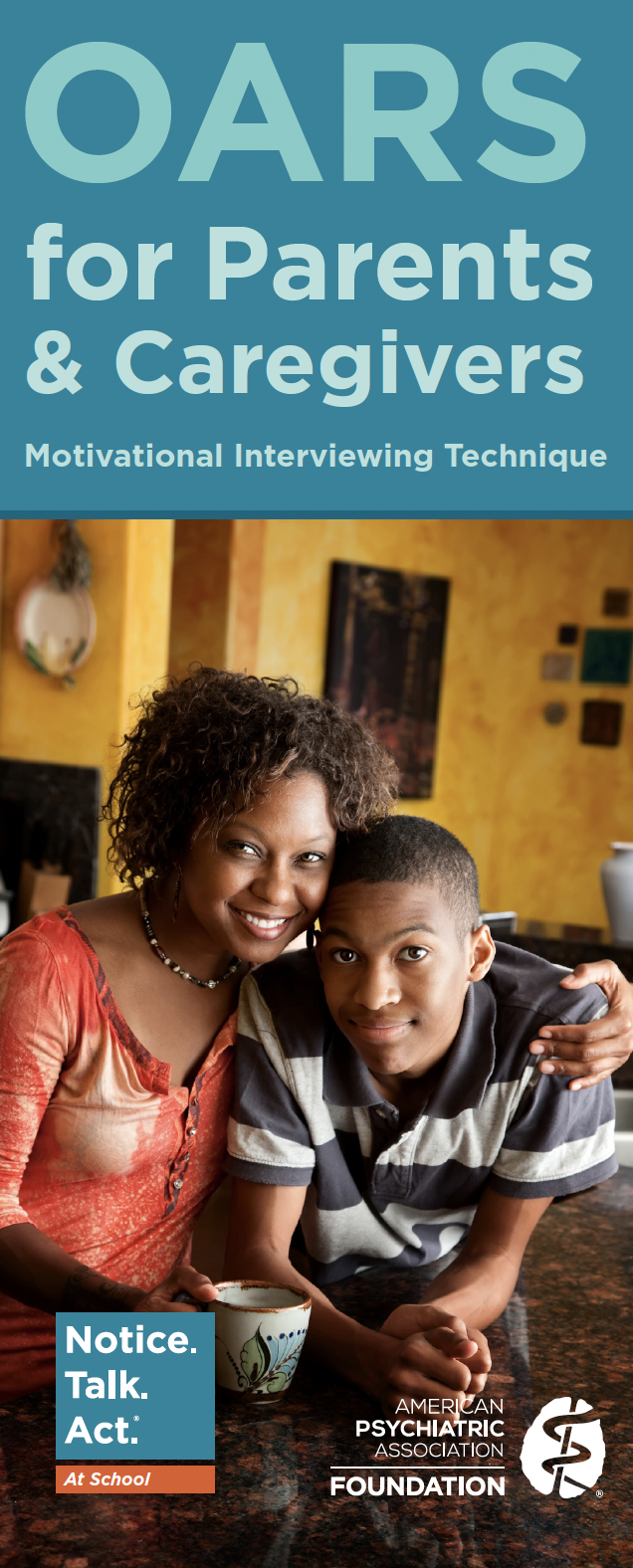OARS Technique: Essential Communication Skills

OARS is an interactive motivational interviewing technique used to facilitate an open conversation. These skills include verbal and non-verbal responses and behaviors. Using the OARS technique supports you in establishing and maintaining a relationship with your child, assessing their needs, and personalizing your conversation and responses.
Key Points to Remember
Remember the goals of talking with your child are to gather information on what might be causing the behaviors you noticed, showing that you care, and to determine if they need to see a provider.
Remember if your child does not disclose information that would deem a higher level of care, you still spent time building a stronger relationship, and they may feel more comfortable coming to you if something does happen to them.
Remember to practice the OARS technique with others in your community! You may find that they can provide you with critical feedback that helps you improve your skills. This is something that, with more practice, will feel more comfortable over time and will become second nature in your interactions with your child.
Open-Ended Questions
- Establish a safe environment and help to build a trusting relationship.
- Explore, clarify, and gain an understanding of your child’s world.
- Learn about your child’s experiences, thoughts, feelings, beliefs, and hopes for the future.
Let's practice! You might say:
- How can I help you with ___?
- Help me understand ___?
- How would you like things to be different?
- What are the good things about ___ and what are the less good things about it?
- What have you tried before to make a change?
- What do you want to do next?
Affirming
- Build a relationship, demonstrate empathy, and affirm your child’s strengths and abilities.
- Build on your child’s level of self-efficacy and share the belief that they can be responsible for their own decisions and choices.
Lets's practice! You may say:
- It’s not always easy…
- It sounds like you’ve been really thoughtful about...
- You’re really trying hard to…
- It seems like you are really good at…
Reflecting
- Listen, observe, and share (reflect on) your own perceptions of what your child shares.
- Reflect on the words that they use (don’t be afraid to use the same words as them).
- Reflect on behavior and feelings.
- Your child gains an opportunity to “hear” your experience of what was shared reflected back to them.
Let’s practice reflecting words, emotions, and/or behaviors!
- Reflecting words: “Some of what I heard you say…”
- Reflecting emotions: “You seem to be feeling…”
- Reflecting behavior: “I noticed… [ex: tears in your eyes]”
Summarizing
- Help move the conversation from the beginning, through the middle, to closing.
- Check that you are understanding your child’s goals and preferences.
- Confirm that your child understands the key elements of a plan.
Let’s practice! Summarizing can be demonstrated in three ways:
- A collective summary — So let’s go over what we have talked about so far.
- A linking summary — A minute ago you said you wanted to talk to… Would you like to talk more about how you might try?
- A transitional summary to close — So, you’ve just described your plan. We’re always here to help in any way.
An Example of How to Apply OARS
Sally recently is getting poor grades at school and has been isolating from the rest of the family. You notice that she always wears long sleeve shirts and pants even in very warm weather. One day, Sally is sobbing alone, while superficially cutting her forearms with a razor blade in her room. You are concerned and decide to use OARS techniques to talk to her.
- O: You sit down next to Sally; eye contact connects with her at the moment. You are curious but non-judgmental about the cutting marks. “You look upset. What is going on, Sally?” “I don’t know.”
- R: “I noticed that you were sad and didn’t come down for dinner. It doesn’t feel good to worry alone. Perhaps sharing the worries may feel better?” “I broke up with my boyfriend, Jimmy. My heart was broken and numb.”
- R: “I bet ending a relationship must be sad and disappointing to you.” “Yeah, it made me feel like no one loves me anymore. That’s why I’m cutting-to punish myself.”
- O: “This makes me feel really sad, too, Sally, and this also makes me worry. When you are cutting, what are you trying to do?” “I used to think of killing myself, but I am so useless and so afraid that I didn’t think further. No one cares if I do anyway.”
- A: “It might seem to feel that way since you broke up with Jimmy, but your dad and I love you, and your friends care for you, and support you.” “I know. I just don’t know how to talk to people about my feelings.”
- S: “So, what I gather is that you feel sad since the recent breakup and need someone to talk with about those feelings. Please do not worry alone. Next time, if you feel sad and ever have the thought of hurting yourself, please reach out to me or any of us you are close with. Is it ok if I check in with
Mental Health Resources
- APA Foundation
apaf.org/schools - American Psychiatric Association (APA)
psychiatry.org/patients-families - The Mental Health Coalition
thementalhealthcoalition.org - The Aakoma Project
aakomaproject.org - National Latino Behavioral Health Association
nlbha.org - Well Beings
wellbeings.org - National Suicide Prevention Lifeline
800-273-8255 - The TREVOR Project
1-866-488-7386
thetrevorproject.org
Immediate Concerns
If you feel your child is a danger to themselves or others (e.g., expressing thoughts of hurting themselves or others), please immediately talk to your child’s pediatrician, call 911 or 988 starting July 16, 2022, or go to the nearest emergency room.
This brochure’s creation was supported by the 2021-2022 APAF School Fellows
